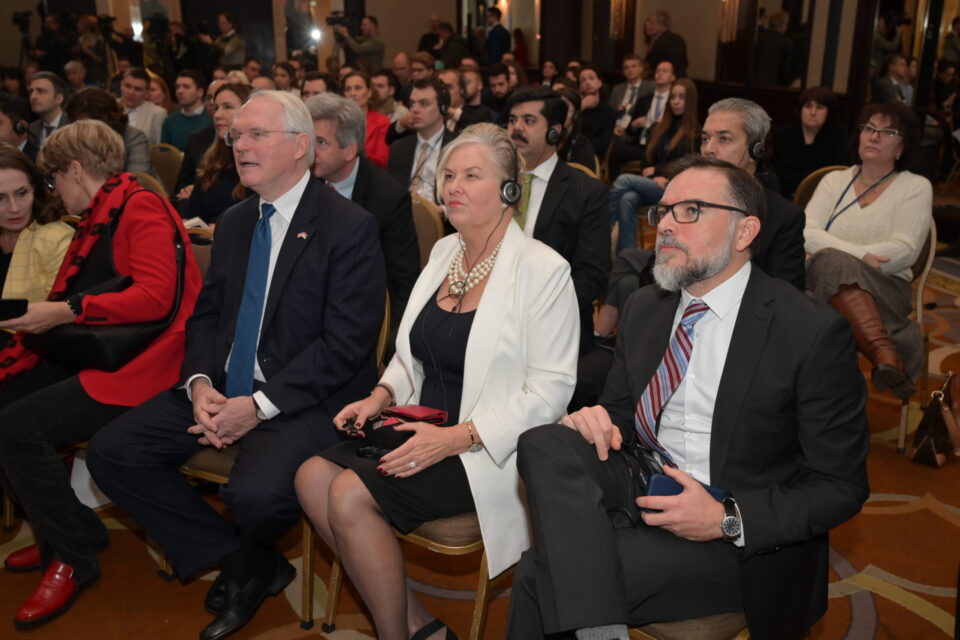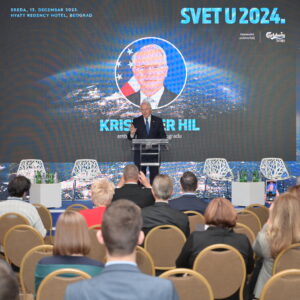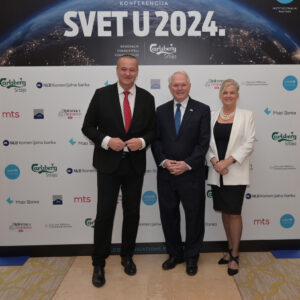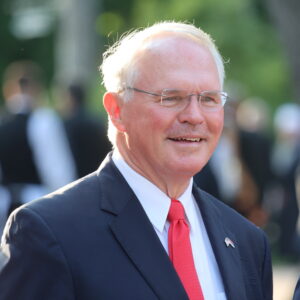At the World in 2024 Conference, U.S. Ambassador H. E. Christopher Hill maps out a road to cooperation, EU integration, and global empathy
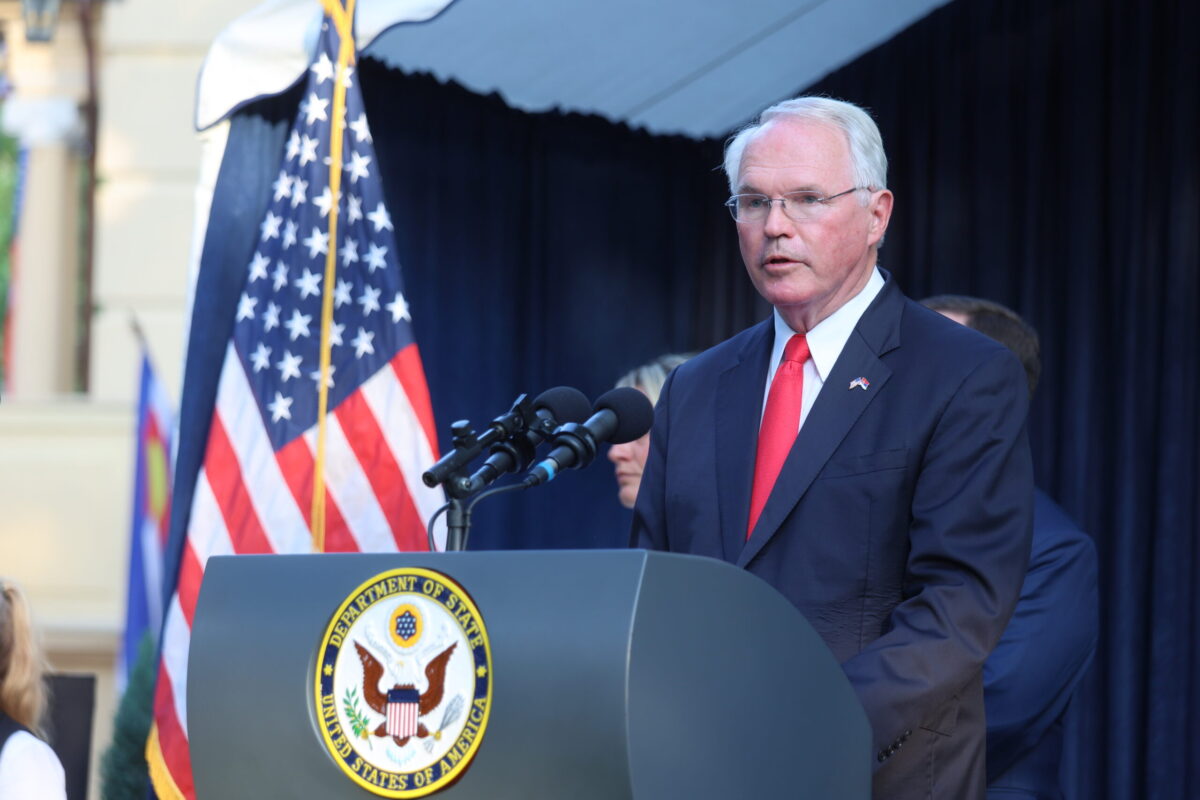 In a speech that captured both the challenges and opportunities awaiting Serbia and the Balkans in 2024, U.S. Ambassador to Serbia H. E. Christopher R. Hill, addressed attendees at the “Svet u 2024.” conference, offering insights on Serbia’s path forward, regional cooperation, and global responsibilities. Ambassador Hill began by humorously acknowledging the difficulty of predicting the upcoming year, stating, “I’m having enough trouble getting through 2023.”
In a speech that captured both the challenges and opportunities awaiting Serbia and the Balkans in 2024, U.S. Ambassador to Serbia H. E. Christopher R. Hill, addressed attendees at the “Svet u 2024.” conference, offering insights on Serbia’s path forward, regional cooperation, and global responsibilities. Ambassador Hill began by humorously acknowledging the difficulty of predicting the upcoming year, stating, “I’m having enough trouble getting through 2023.”
However, he quickly turned to the more serious subject of Serbia’s future and its role in a broader context.
“There’s no question at all that 2024 will be a very complex year, and the outcome of it, I think, will depend on a lot of factors. It’s kind of rare to have a diplomat quote or paraphrase William Shakespeare, but I’ll do it anyway. Our destiny in 2024 does not lie in the stars, it lies with all of us. It lies with the choices that we’re all going to make. I think the 2024. will be a momentous year for many countries, including my own. For those of you who don’t know, we have an election every four years. So, we’ll see how that goes. But let me just say that for Serbia especially, I think 2024. is a very important year. And for Serbs, all Serbs, to understand that their destiny does not lie in the stars, but nor does it lie in Washington or Brussels or even in Beijing, the destiny of Serbia lies with Serbs. I think this is a time when Serbs need to think very hard about what they want to do in this coming year.”
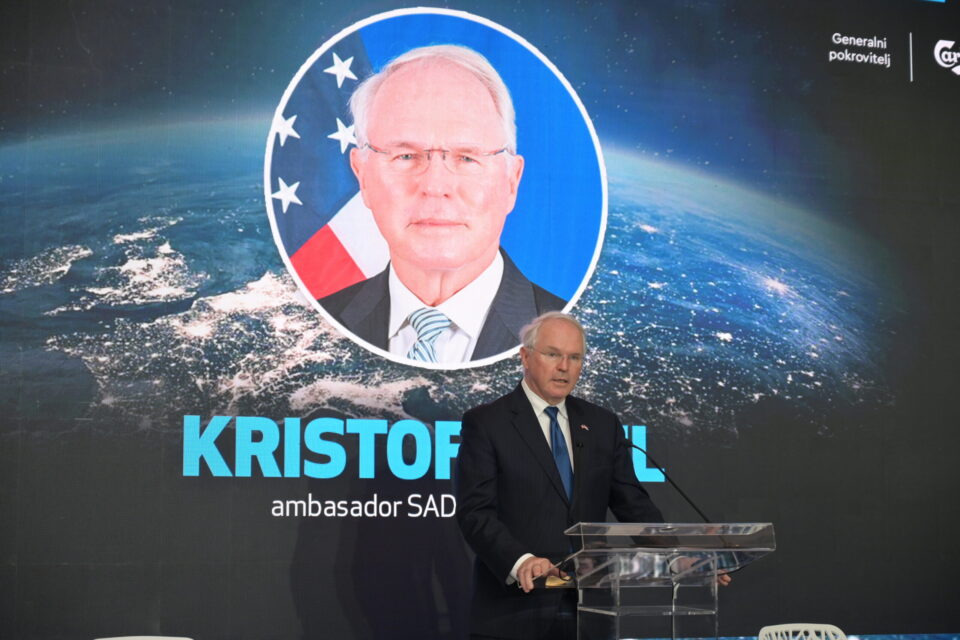 His speech took an optimistic turn when discussing Serbia’s potential accession to the European Union: “I’ve just come from a visit to Brussels. I can report it was cloudy and rainy in Brussels. But, from the perspective of Brussels, of the European Union, looking at further expansion, it was quite something new for me. It is very real what is going on today, as people have talked about European Union enlargement. I know many people, they’ve heard that for many years. But I think in 2024., this will be a very, very important year for those who want to see further enlargement and want to see Serbia in a different place from where it has been. Now, it is customary for American diplomats to stand up and welcome anybody, anywhere, membership in the European Union. That is not our job. It may be our feelings about these things, but if Serbia wants to join the European Union, its destiny is with itself. What does Serbia have to do? Well, there are a lot of things. And they will be pointed out to Serbs on what they have to do. I think in being in Brussels for a few days, I learned a couple of very important things. One, Brussels would welcome Serbia as an eventual member of the European Union to go through this phased process, which, after all, involves a very important phase, which would be one of the first phases. That is the phase of joining a single market. My sense being in Brussels was there was a lot of goodwill. At the same time, it was very clear that people expect that when a country enters the European Union, they try to address their problems and try to solve those problems before they enter. Because no organization, neither the European Union nor any other organization, wants to have more problems. They want to have more members. They want to have more solutions, not necessarily more problems. So that is going to require a lot of work. Fortunately, I think Serbia has help in this regard.”
His speech took an optimistic turn when discussing Serbia’s potential accession to the European Union: “I’ve just come from a visit to Brussels. I can report it was cloudy and rainy in Brussels. But, from the perspective of Brussels, of the European Union, looking at further expansion, it was quite something new for me. It is very real what is going on today, as people have talked about European Union enlargement. I know many people, they’ve heard that for many years. But I think in 2024., this will be a very, very important year for those who want to see further enlargement and want to see Serbia in a different place from where it has been. Now, it is customary for American diplomats to stand up and welcome anybody, anywhere, membership in the European Union. That is not our job. It may be our feelings about these things, but if Serbia wants to join the European Union, its destiny is with itself. What does Serbia have to do? Well, there are a lot of things. And they will be pointed out to Serbs on what they have to do. I think in being in Brussels for a few days, I learned a couple of very important things. One, Brussels would welcome Serbia as an eventual member of the European Union to go through this phased process, which, after all, involves a very important phase, which would be one of the first phases. That is the phase of joining a single market. My sense being in Brussels was there was a lot of goodwill. At the same time, it was very clear that people expect that when a country enters the European Union, they try to address their problems and try to solve those problems before they enter. Because no organization, neither the European Union nor any other organization, wants to have more problems. They want to have more members. They want to have more solutions, not necessarily more problems. So that is going to require a lot of work. Fortunately, I think Serbia has help in this regard.”
Our destiny in 2024 does not lie in the stars, it lies with all of us
The Ambassador also touched upon the Brussels Dialogue, expressing confidence in its potential to resolve regional issues. He highlighted the importance of broader cooperation across the Balkans, advocating for initiatives like the Open Balkans and the Berlin Process, which aim to transform borders from dividers to connectors: “I think the European Union, what is known as the Brussels Dialogue, has all the elements on the table that really need to be addressed. And I think this can be done. It’s not going to be easy. There’s a lot of give and take, but I am convinced that there is a real opportunity to get this Brussels Dialogue moving in the coming months. And I really do believe that 2024 can be a very important year for Serbia in terms of addressing some of these regional issues. Now, of course, the Brussels Dialogue deals only with the issue of Belgrade and Priština. And what I think everyone should want to see is a broader addressing of the overall problems of the region, not just of Priština and Belgrade. And here, I know Serbia has worked over the years on something called Open Balkans. There are other models for this type of cooperation. We’ve seen one known as the Berlin Process. I am indifferent to what you call this model of regional cooperation. But I must say, it is high time for more cooperation. It is high time to turn these borders into not things that divide people, but rather things that join people. So, I hope in 2024, there will be much greater effort on these regional solutions and on finding a common language, and a capacity to work with each other. This will be, I think, a very great challenge for Serbia as the largest really, of the Balkan six countries. It will be a challenge for Serbia. And frankly, with many great challenges come great responsibilities. And I like to think that Serbia will be up to the responsibilities and challenges to make sure the Balkans is an oasis of peace.”
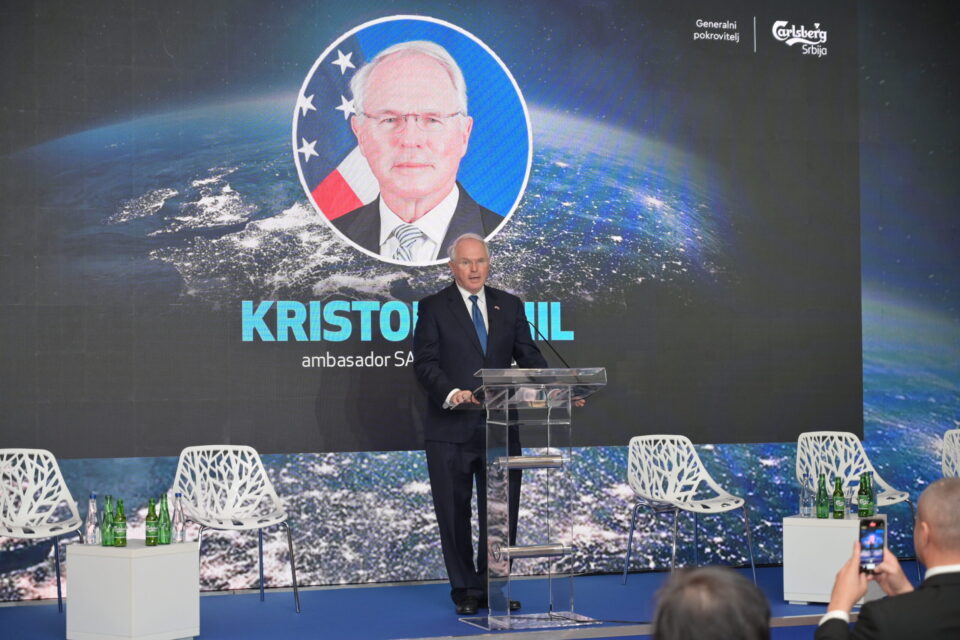 In a compelling segment of his address, Ambassador Hill discussed the war in Europe, lauding Serbia’s growing relationship with Ukraine and emphasizing the need for a unified stance against aggression: “There is no question that we face very difficult problems more broadly. In Europe, we have a war that continues to go on and on. And we can hope, though hope can never be a basis for policy, we can expect, and we can work toward a situation where Russia will understand that invading its neighbors doesn’t help anybody, least of all Russia. And I hope we can all stay together in being opposed to this terrible, terrible aggression that has taken place right here in Europe. Serbia, I think, has done well to date to work with Ukraine, to be actually closer to Ukraine than it’s been in the past. There are a lot of similarities these countries have. They have a lot of history. They know each other well. I hope to see that continue in 2024.”
In a compelling segment of his address, Ambassador Hill discussed the war in Europe, lauding Serbia’s growing relationship with Ukraine and emphasizing the need for a unified stance against aggression: “There is no question that we face very difficult problems more broadly. In Europe, we have a war that continues to go on and on. And we can hope, though hope can never be a basis for policy, we can expect, and we can work toward a situation where Russia will understand that invading its neighbors doesn’t help anybody, least of all Russia. And I hope we can all stay together in being opposed to this terrible, terrible aggression that has taken place right here in Europe. Serbia, I think, has done well to date to work with Ukraine, to be actually closer to Ukraine than it’s been in the past. There are a lot of similarities these countries have. They have a lot of history. They know each other well. I hope to see that continue in 2024.”
I think everybody in this world needs to take a little lesson in tone and learn how to talk to others
Finally, Ambassador Hill expanded his focus to global environmental and social issues. He spoke of the need to respect our planet and each other, emphasizing the importance of empathy and understanding in international relations: “I would like to speak even more broadly as this photograph of planet Earth taken from outer space might suggest. We live in a very fragile, fragile Earth. And while Elon Musk may contemplate someday moving to Mars, the rest of us are probably going to have to stay right here on planet Earth. So, we need to treat our air with greater respect. We need to treat the water that we drink with greater respect. We need to treat the land between our feet with greater respect. But ultimately, we’re going to have to do a much better job of treating each other with greater respect. I think everybody in this world needs to take a little lesson in tone and learn how to talk to others, learn how others think about things, and develop a sense of empathy. Empathy can be a learned skill. You’re not just born with it. You can learn it, and think, how am I coming across to that person? What do I need to do to make that person understand my point of view? And probably the first thing I need to do is understand that person’s point of view. So let us resolve as we face this critical year in 2024. that not only will we treat the Earth better, but we will treat each other much better.”
Ambassador Hill’s speech at the “Svet u 2024” conference not only outlined the challenges facing Serbia and the Balkans but also offered a vision of hope and cooperation. His message was clear: the future lies not in predetermined fate but in the hands of those willing to work for a better tomorrow.
